The Customer Service Software Market is estimated to be valued at USD 51.3 billion in 2025 and is projected to reach USD 96.6 billion by 2035, registering a compound annual growth rate (CAGR) of 6.5% over the forecast period.
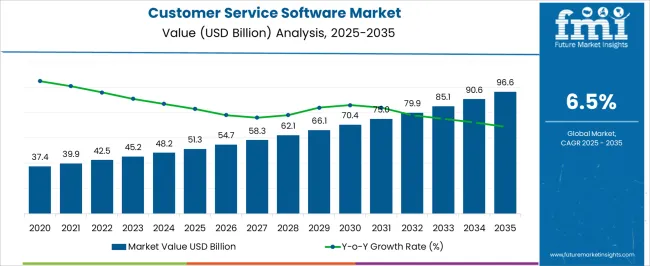
| Metric | Value |
|---|---|
| Customer Service Software Market Estimated Value in (2025 E) | USD 51.3 billion |
| Customer Service Software Market Forecast Value in (2035 F) | USD 96.6 billion |
| Forecast CAGR (2025 to 2035) | 6.5% |
The Customer Service Software market is experiencing robust growth driven by the increasing emphasis on customer experience, operational efficiency, and digital transformation across industries. Organizations are shifting from traditional customer support channels to integrated software platforms that enable omnichannel engagement, automation, and data-driven insights. The demand for scalable and flexible solutions is further propelled by growing expectations for real-time support and personalized interactions.
Investments in cloud infrastructure, artificial intelligence, and machine learning have facilitated the rapid adoption of advanced customer service tools, allowing businesses to streamline operations and reduce response times. Rising competition across sectors and the need for enhanced customer retention strategies are driving enterprises to prioritize software solutions capable of supporting analytics, self-service, and intelligent routing.
Additionally, the market outlook is supported by regulatory emphasis on data protection and privacy, which encourages adoption of secure, managed platforms As businesses continue to embrace digital channels for customer interactions, the Customer Service Software market is positioned for sustained expansion with opportunities in both large-scale enterprises and small to medium-sized businesses.
The customer service software market is segmented by deployment model, enterprise type, component, industry, and geographic regions. By deployment model, customer service software market is divided into Saas-Based and On Premise. In terms of enterprise type, customer service software market is classified into Large Enterprise and Small And Medium Enterprise. Based on component, customer service software market is segmented into Software and Services. By industry, customer service software market is segmented into Financial, Government, Manufacturing, Internet & Telecom, and Others. Regionally, the customer service software industry is classified into North America, Latin America, Western Europe, Eastern Europe, Balkan & Baltic Countries, Russia & Belarus, Central Asia, East Asia, South Asia & Pacific, and the Middle East & Africa.
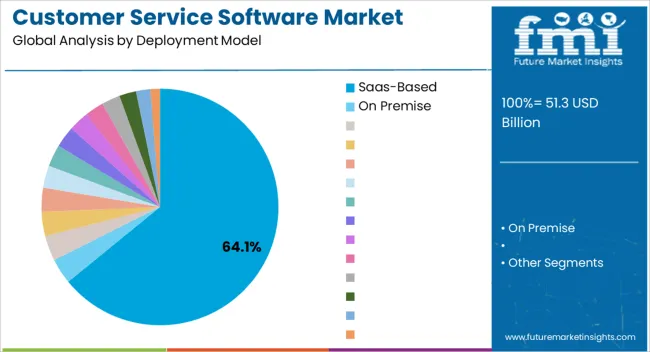
The SaaS-based deployment model is projected to hold 64.10% of the Customer Service Software market revenue in 2025, making it the leading deployment type. This dominance is being driven by the flexibility, cost-effectiveness, and scalability inherent in cloud-based solutions. Organizations are increasingly favoring SaaS because it eliminates the need for extensive on-premise infrastructure, reduces upfront capital expenditure, and allows for automatic updates and maintenance.
Rapid deployment capabilities and seamless integration with existing enterprise systems further enhance its appeal, enabling businesses to quickly adapt to evolving customer needs. Additionally, SaaS-based models support remote accessibility and multi-location collaboration, which has become a critical requirement in modern work environments.
The high adoption is reinforced by enhanced security protocols, flexible subscription pricing, and the ability to scale up or down based on organizational needs As businesses continue to prioritize agility and operational efficiency, the SaaS-based deployment model is expected to maintain its leadership position in the market.
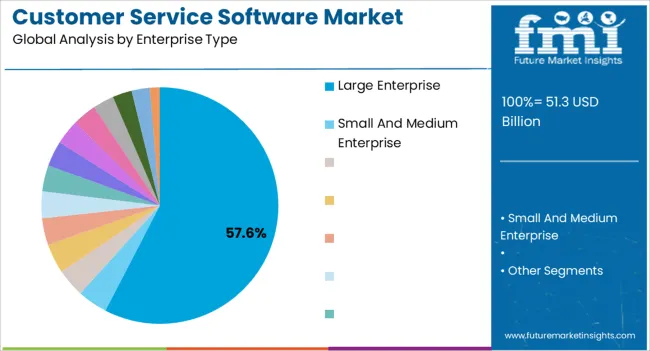
The Large Enterprise segment is expected to account for 57.60% of the Customer Service Software market revenue in 2025, establishing it as the largest end-user category. This leadership has been supported by the complex customer support requirements of large organizations, which necessitate integrated platforms capable of handling high volumes of interactions across multiple channels.
Large enterprises are increasingly adopting software solutions that provide advanced analytics, AI-driven automation, and workflow optimization to enhance service efficiency and improve customer satisfaction. Additionally, the ability to consolidate customer data across departments and geographies through a single platform has facilitated more informed decision-making and proactive issue resolution.
The segment’s growth has been reinforced by substantial IT budgets, strong digital transformation initiatives, and the need to maintain competitive advantage in customer experience management As enterprises continue to scale globally and focus on retention and loyalty, the Large Enterprise segment is anticipated to remain the dominant consumer of customer service software solutions.
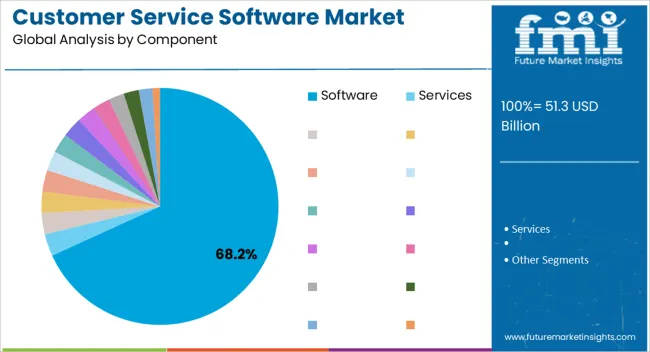
The Software component segment is projected to hold 68.20% of the Customer Service Software market revenue in 2025, representing the leading share. This prominence is being driven by the increasing adoption of software solutions that enable automation, artificial intelligence integration, omnichannel support, and analytics capabilities. The ability to customize, upgrade, and scale software without significant hardware changes has contributed to widespread deployment across industries.
Additionally, software components allow for flexible licensing and subscription models, enabling organizations to pay for only the features and scale they require. Demand for enhanced security, real-time reporting, and AI-enabled predictive analytics has further strengthened adoption.
The software-centric approach has been favored over hardware-heavy solutions due to lower total cost of ownership, easier deployment, and faster innovation cycles As enterprises and large organizations continue to focus on customer satisfaction and operational efficiency, the software component is expected to sustain its leading position in the market.
The increasing need for real-time problem solving and strong relationship building with customers are fueling the demand for customer service software market. Customer service software enables to track, organize and manage customer request using a single platform.
Customer service software consolidates the issues and chats and enhances CRM and sales with more insights and personalized campaigns. The main features of the customer service software are ticketing system, social post, calls, transform customer emails, chat messages, and others and direct it to agents for immediate resolution. Components of customer service software are service desk, help desk, IT/IS support, technical support, support center, customer support center, customer service center, call center, and contact center.
The major advantages of customer service software are real-time problem solving, sales and lead generation, relationship building, getting customer feedback, real-time analytics, improved communication with team and customers, stronger collaboration, increase support efficiency, improved customer loyalty, and others.
The three major components considered while buying customer service software are supported style, usability, and price. Customer service software support style includes features such as live chat, email and call support, comprehensive knowledge-based article, or a combination of all of these. Customer service software usability includes intuitive User Interface (UI) with limited requirement of training.
Overall cost of customer service software is another important parameter and the purchase decision is based on the features and services offered to the customers of customer service software. Other features of customer service software include clean interface, language support, custom preferences, custom fields, internal communication and collaboration tool, knowledge-based content management system, personalized customer service, remote customer service, social media customer service, and others.
The customer service software market is expected to grow at a CAGR of around 17% during the forecast period. Several developments in customer service software, with reference to technology, the proliferating growth rate of the market, along with the recent developments and innovations are expected to drive the global customer service software market during the forecast period.
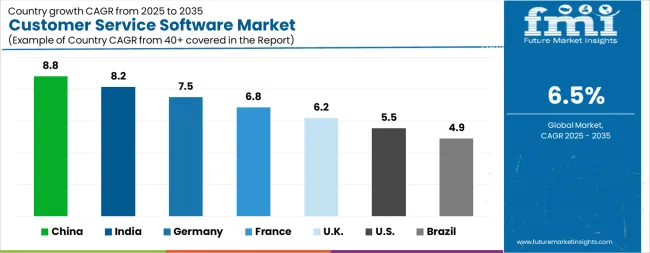
| Country | CAGR |
|---|---|
| China | 8.8% |
| India | 8.2% |
| Germany | 7.5% |
| France | 6.8% |
| UK | 6.2% |
| USA | 5.5% |
| Brazil | 4.9% |
The Customer Service Software Market is expected to register a CAGR of 6.5% during the forecast period, exhibiting varied country level momentum. China leads with the highest CAGR of 8.8%, followed by India at 8.2%. Developed markets such as Germany, France, and the UK continue to expand steadily, while the USA is likely to grow at consistent rates. Brazil posts the lowest CAGR at 4.9%, yet still underscores a broadly positive trajectory for the global Customer Service Software Market. In 2024, Germany held a dominant revenue in the Western Europe market and is expected to grow with a CAGR of 7.5%. The USA Customer Service Software Market is estimated to be valued at USD 17.9 billion in 2025 and is anticipated to reach a valuation of USD 30.6 billion by 2035. Sales are projected to rise at a CAGR of 5.5% over the forecast period between 2025 and 2035. While Japan and South Korea markets are estimated to be valued at USD 2.6 billion and USD 1.8 billion respectively in 2025.
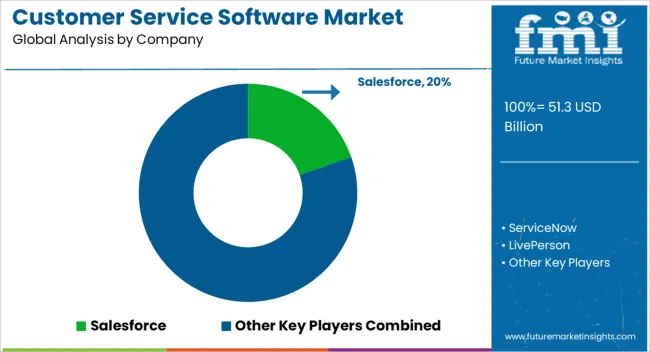
| Item | Value |
|---|---|
| Quantitative Units | USD 51.3 Billion |
| Deployment Model | Saas-Based and On Premise |
| Enterprise Type | Large Enterprise and Small And Medium Enterprise |
| Component | Software and Services |
| Industry | Financial, Government, Manufacturing, Internet & Telecom, and Others |
| Regions Covered | North America, Europe, Asia-Pacific, Latin America, Middle East & Africa |
| Country Covered | United States, Canada, Germany, France, United Kingdom, China, Japan, India, Brazil, South Africa |
| Key Companies Profiled | Salesforce, ServiceNow, LivePerson, Help Scout, Zoho, Zendesk, Chatbot.com, Intercom, Freshworks, Hiver, SAP, Kayako, and IBM |
The global customer service software market is estimated to be valued at USD 51.3 billion in 2025.
The market size for the customer service software market is projected to reach USD 96.6 billion by 2035.
The customer service software market is expected to grow at a 6.5% CAGR between 2025 and 2035.
The key product types in customer service software market are saas-based and on premise.
In terms of enterprise type, large enterprise segment to command 57.6% share in the customer service software market in 2025.
Explore Similar Insights

Thank you!
You will receive an email from our Business Development Manager. Please be sure to check your SPAM/JUNK folder too.
Chat With
MaRIA